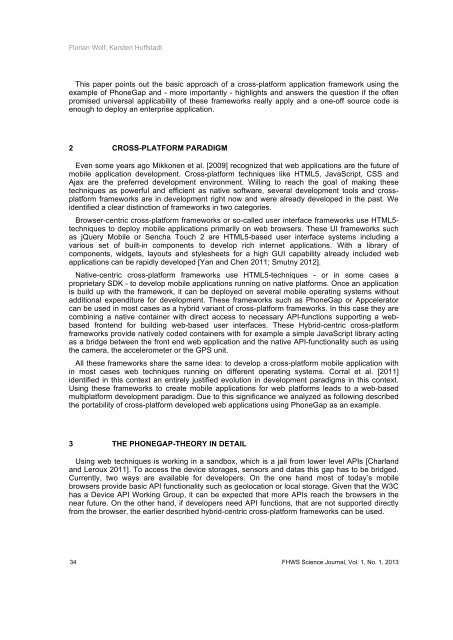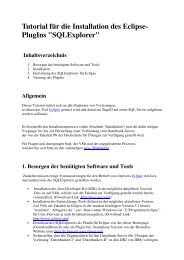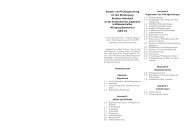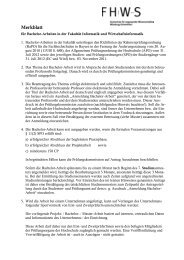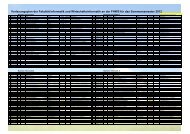FHWS Science Journal - Fakultät Informatik und Wirtschaftsinformatik
FHWS Science Journal - Fakultät Informatik und Wirtschaftsinformatik
FHWS Science Journal - Fakultät Informatik und Wirtschaftsinformatik
You also want an ePaper? Increase the reach of your titles
YUMPU automatically turns print PDFs into web optimized ePapers that Google loves.
Florian Wolf, Karsten Huffstadt<br />
This paper points out the basic approach of a cross-platform application framework using the<br />
example of PhoneGap and - more importantly - highlights and answers the question if the often<br />
promised universal applicability of these frameworks really apply and a one-off source code is<br />
enough to deploy an enterprise application.<br />
2 CROSS-PLATFORM PARADIGM<br />
Even some years ago Mikkonen et al. [2009] recognized that web applications are the future of<br />
mobile application development. Cross-platform techniques like HTML5, JavaScript, CSS and<br />
Ajax are the preferred development environment. Willing to reach the goal of making these<br />
techniques as powerful and efficient as native software, several development tools and crossplatform<br />
frameworks are in development right now and were already developed in the past. We<br />
identified a clear distinction of frameworks in two categories.<br />
Browser-centric cross-platform frameworks or so-called user interface frameworks use HTML5-<br />
techniques to deploy mobile applications primarily on web browsers. These UI frameworks such<br />
as jQuery Mobile or Sencha Touch 2 are HTML5-based user interface systems including a<br />
various set of built-in components to develop rich internet applications. With a library of<br />
components, widgets, layouts and stylesheets for a high GUI capability already included web<br />
applications can be rapidly developed [Yan and Chen 2011; Smutny 2012].<br />
Native-centric cross-platform frameworks use HTML5-techniques - or in some cases a<br />
proprietary SDK - to develop mobile applications running on native platforms. Once an application<br />
is build up with the framework, it can be deployed on several mobile operating systems without<br />
additional expenditure for development. These frameworks such as PhoneGap or Appcelerator<br />
can be used in most cases as a hybrid variant of cross-platform frameworks. In this case they are<br />
combining a native container with direct access to necessary API-functions supporting a webbased<br />
frontend for building web-based user interfaces. These Hybrid-centric cross-platform<br />
frameworks provide natively coded containers with for example a simple JavaScript library acting<br />
as a bridge between the front end web application and the native API-functionality such as using<br />
the camera, the accelerometer or the GPS unit.<br />
All these frameworks share the same idea: to develop a cross-platform mobile application with<br />
in most cases web techniques running on different operating systems. Corral et al. [2011]<br />
identified in this context an entirely justified evolution in development paradigms in this context.<br />
Using these frameworks to create mobile applications for web platforms leads to a web-based<br />
multiplatform development paradigm. Due to this significance we analyzed as following described<br />
the portability of cross-platform developed web applications using PhoneGap as an example.<br />
3 THE PHONEGAP-THEORY IN DETAIL<br />
Using web techniques is working in a sandbox, which is a jail from lower level APIs [Charland<br />
and Leroux 2011]. To access the device storages, sensors and datas this gap has to be bridged.<br />
Currently, two ways are available for developers. On the one hand most of today’s mobile<br />
browsers provide basic API functionality such as geolocation or local storage. Given that the W3C<br />
has a Device API Working Group, it can be expected that more APIs reach the browsers in the<br />
near future. On the other hand, if developers need API functions, that are not supported directly<br />
from the browser, the earlier described hybrid-centric cross-platform frameworks can be used.<br />
34 <strong>FHWS</strong> <strong>Science</strong> <strong>Journal</strong>, Vol. 1, No. 1, 2013


